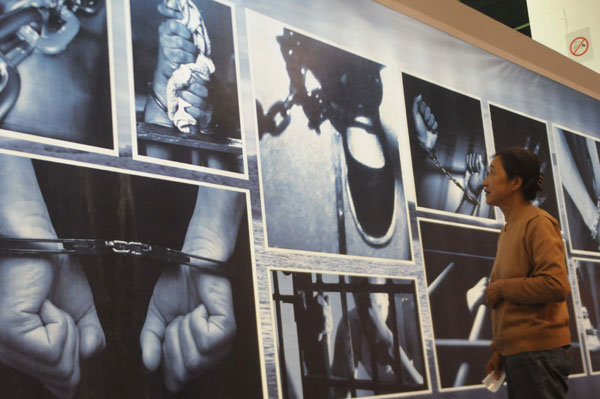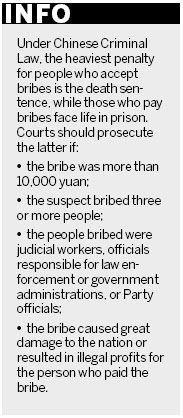Experts say light punishments are not sufficiently effective as deterrent
The penalties for people who offer bribes should be toughened to strengthen the country’s fight against corruption, legal experts say.
For years, courts have been giving light sentences to people providing bribes, and in some cases failing to punish them at all, said Ren Jianming, director of Beihang University’s clean-governance research and education center.
He said his information is based on a provincial court’s research report.
 |
|
A visitor watches an exhibition showing achievements made in the fight against bribery, in Hangzhou, Zhejiang province. Zhu Yinwei / for China Daily |
A report in June by Changzhou’s Intermediate People’s Court in Jiangsu province also found that low- to mid-level courts in the city heard 209 cases in 2009 and 2010 involving people accepting bribes, although the number of trials for people who paid bribes was only 20.
Among the people involved in those 20 cases, 14 were sentenced, with 11 given probation and another six freed without punishment, the report said.
The Supreme People’s Procuratorate has given criminal punishments to 4,217 people who paid bribes in 2011, a 6.2 percent year-on-year increase.
However, Ren said he does not believe the measures will deter people from offering bribes.
"Some judicial authorities give heavy penalties for people who accept bribes, but they show too much leniency when dealing with those providing the bribes," he said.
|
 |
In 2007, Hu Xing received a life sentence for accepting bribes worth 40 million yuan ($6.3 million) while he was deputy director of Yunnan province’s transport department. However, no details were ever revealed about whether the businessman from Guangdong province who paid him the bulk of the bribes — 32 million yuan — was punished.
"Tolerance of those who offer bribes provides fertile ground for corruption, while light punishments will only allow more people to believe that the crime will not be taken seriously by the courts," Ren added.
Zhu Lijia, a professor at the Chinese Academy of Governance, agreed, adding that the existing penalties are not a deterrent for those offering large bribes.
"If people continue to be able to buy an official position or construction project with money, it will have a very negative effect on China’s legal environment," Zhu said.
He added that bribery in Western countries is a felony, and those providing the bribes face fines and heavy prison sentences.
Zhou Liwen, a prosecutor in Changsha, Hunan province, said he heard of a case in Australia in which a mother gave an expensive gift to a teacher, hoping to get her child into the school. However, she was unsuccessful.
"The teacher was very angry and said the school no longer welcomed her," Zhou said.
Each resident should enhance his or her awareness and help authorities curb such corrupt behavior, Zhou added.
He said that bribery mainly happens during the bidding process for important infrastructure projects.
However, Zhou said, the main cause of the problem lies in the absence of judicial interpretation that clearly states the activity of offering bribes, causing confusion for legal workers when hearing such cases.
Yi Shenghua, a lawyer specializing in bribery cases at Yingke Law Firm in Beijing, said that in some cases, people have no other choice but to give money.
For example, according to court documents, Hou Xingzhi — the former director of Chongqing Energy Group who was sentenced to life in prison for accepting 6.25 million yuan in bribes between 1996 and April 2011 — demanded money from low-level officials and residents, on one occasion to buy his son a new car.
Chongqing No 1 Intermediate People’s Court has never disclosed details on the people who handed over bribes.
"It’s also common to see several people offering bribes to one official, although the amounts are not very big, say, 2,000 yuan," Yi said. "Small amounts usually do not constitute a crime."
The phenomenon will not be easily rooted out because under law, some people know their offering bribes will incur only minor penalties, costing much less than what they could possibly gain through bribing, Yi said.
In this way, how to stop officials from accepting bribes is still the key to correcting the problem, he said.
"After all, no acceptance, no bribery," he added.
caoyin@chinadaily.com.cn
